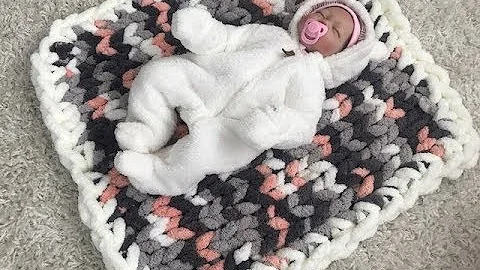Master the Art of Tapestry Crochet
Table of Contents:
- Introduction
- Turning Skeins into Yarn Balls
- Organizing Yarn with Containers
- Starting the Tapestry Crochet
- Crocheting with Multiple Colors
- Making Color Changes
- Following a Repetitive Color Pattern
- Avoiding Tangling Threads
- Creating Interesting Textures
- Conclusion
Introduction
Tapestry crochet is a technique that allows you to work with multiple colors in your crochet projects. In this article, we will explore the steps and techniques for working tapestry crochet with more than 2 colors. We will cover everything from turning skeins into yarn balls to making color changes and following a repetitive color pattern. By the end of this article, you'll have the knowledge and skills to add vibrant color to your crochet projects.
Turning Skeins into Yarn Balls
Before we start working with multiple colors, it is important to turn our skeins into yarn balls. This will make it easier to manage and control the yarn as we crochet. If you don't have yarn bowls, you can use a box or a container with holes. Place the balls of yarn inside the container, ensuring there is some space between the yarn bowl and the container to allow for movement and spinning.
Organizing Yarn with Containers
To avoid tangling the threads while crocheting with multiple colors, it is important to organize the yarn using containers. By pulling each strand of color through separate holes, you can easily make color changes without getting the threads tangled. Ensure that the container has a hard base to prevent it from moving as you crochet.
Starting the Tapestry Crochet
To start working tapestry crochet with more than 2 colors, create a foundation chain in your desired color. Make sure not to twist your base chains and join in the round with a slip stitch. Place a marker in the first stitch to indicate the beginning of each round, relocating it in the first stitch of every following round. This will help you keep track of your progress.
Crocheting with Multiple Colors
In the initial rounds, focus on crocheting in your beginning chains without adding additional strands. This will help you get familiar with the technique and practice the basic stitches. Once you are comfortable, you can start adding the other three colors. With each stitch, wrap the three additional colors between your crochet hook and working yarn, creating unique color combinations.
Making Color Changes
To make color changes in tapestry crochet, it is important to follow a repetitive color pattern. By crocheting a specific number of stitches with each color, you can seamlessly transition from one color to another. Close the last stitch of the previous color with the new color and wrap the remaining three colors according to the pattern. This will ensure that your color changes are neat and organized.
Following a Repetitive Color Pattern
Continuing with the repetitive color pattern, crochet a specific number of stitches with each color in every round. This consistent pattern will create a beautiful and harmonized design in your tapestry crochet project. Remember to maintain tension in the threads to make the color changes easier and avoid tangling.
Avoiding Tangling Threads
One of the challenges of working with multiple colors in tapestry crochet is preventing the threads from getting tangled. By following the steps outlined in this article, such as organizing the yarn with containers and wrapping the additional colors in a specific way, you can avoid tangling and ensure smooth crocheting experience.
Creating Interesting Textures
Working with multiple colors in tapestry crochet not only adds vibrancy but also creates interesting textures in your projects. The additional strands of yarn will show through the stitches, giving your work a unique and eye-catching effect. Embrace this texture and use it to your advantage to create stunning and textured crochet pieces.
Conclusion
Tapestry crochet with more than 2 colors opens up a world of possibilities in the crochet world. By following the steps and techniques outlined in this article, you can confidently work with multiple colors and create beautiful and vibrant crochet projects. Experiment with different color combinations, patterns, and textures to unleash your creativity in tapestry crochet.
Highlights:
- Learn how to work tapestry crochet with more than 2 colors
- Organize yarn using containers to avoid tangling
- Follow a repetitive color pattern for neat color changes
- Create unique textures in your crochet projects
- Explore the possibilities of tapestry crochet with multiple colors
FAQ:
Q: Can I use any type of yarn for tapestry crochet with multiple colors?
A: Yes, you can use any type of yarn for tapestry crochet. However, keep in mind that different yarn weights and fibers may produce different results in terms of texture and drape.
Q: How do I carry the unused colors while crocheting?
A: To carry the unused colors, simply let them lay over the stitches of the previous row without pulling or loosening them. This will ensure that the colors are easily accessible when you need to make a color change.
Q: Can I create complex patterns with tapestry crochet using multiple colors?
A: Absolutely! Tapestry crochet with multiple colors allows you to create intricate and detailed patterns. By following the repetitive color pattern and experimenting with different color combinations, you can create stunning designs in your crochet projects.
Q: Are there any specific crochet stitches that work best with tapestry crochet?
A: While you can use any crochet stitch for tapestry crochet, single crochet is commonly used due to its tight and dense nature. This helps create a solid fabric with clear color definition. However, you can also incorporate other stitches like half double crochet or double crochet to add variety and texture to your projects.
 WHY YOU SHOULD CHOOSE BEAUTYBADY
WHY YOU SHOULD CHOOSE BEAUTYBADY







